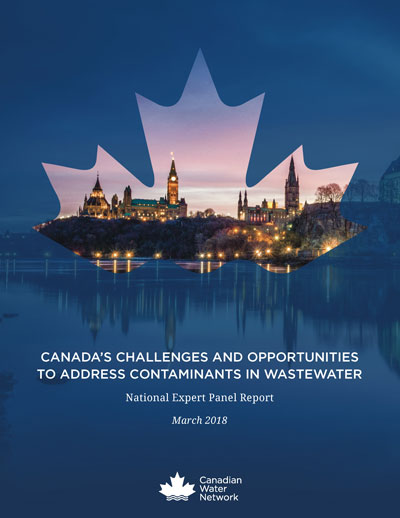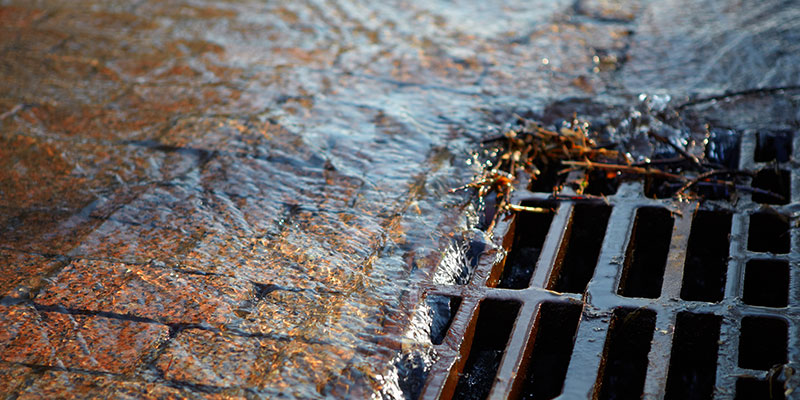Canada’s Challenges and Opportunities to Address Contaminants in Wastewater
Canadian Water Network (2017-2018)

Challenge
Effective management of our wastewater is critical for Canadians across the country, in both large and small communities. The advances that Canada has made in wastewater management are part of an important success story in protecting human health and the environment. The challenge moving forward is to meet the growing complexity of wastes generated by our society. Canada must consider how to make strategic investments that maximize the benefits to society and the environment and prepare our wastewater systems to address the uncertainties of the future.
The current picture of wastewater management in Canada is highly varied. It reflects more than a century of developing solutions to local waste management needs in very different settings. Moving forward, we are faced with an increasingly complex array of chemicals that find their way into wastewater, raising both concerns and uncertainty about the nature of their impacts. Despite our incomplete knowledge about the current and future risks confronting us with respect to wastewater, we cannot suspend decision-making. As municipalities and utilities invest in wastewater systems that will be locked-in for decades, the questions being asked are not only, “What are we required to do?” but also, “What makes sense to do now?”
Project
From October 2017 to March 2018, with support from Environment and Climate Change Canada (ECCC), Canadian Water Network (CWN) led a review of known and emerging contaminants in municipal wastewater and Canada’s options to deal with them. CWN appointed a national expert panel with a strong collective understanding of the knowledge and practice base in wastewater treatment and impacts. The panel was chaired by an internationally-renowned wastewater expert, Dr. Donald Mavinic from the University of British Columbia and engaged a national network of research and practitioner communities to consider three core questions:
- Which wastewater contaminants do we need to worry about most, now and in the future?
- What are the options for Canadian communities to address these contaminants through wastewater treatment?
- What are the important opportunities and trade-offs involved in treatment choices, including resource recovery, cost implications, socio-economic and cultural fit, and related issues like greenhouse gas emissions?
Outputs
The panel’s deliberations were augmented with information and case studies from other experts across Canada through a series of expert working sessions. The experts were asked to share their perspectives on a wide range of topic areas, including regulations, municipal wastewater practice, contaminants of emerging concern in wastewater, environmental impacts associated with wastewater, legal and community perspectives, and treatment technologies.
Broader input was obtained through an online questionnaire that was completed by 78 experts representing a broad range of perspectives and sectors from all geographic regions of Canada. Canadian Water Network worked with the expert panel to develop the questionnaire, which was structured to provide input on the core questions being considered.
In addition to the working sessions and national questionnaire, the expert panel was supported in their work through the preparation of high-level literature scans in key areas of relevance for their discussion, which are summarized in four supporting documents.
A culminating report was prepared by the expert panel to provide critical insights that can inform and empower decision-makers and stakeholders to choose the most effective wastewater treatment investments, policies and practices. The report identifies where wastewater treatment represents a particularly effective approach to protecting human health and the environment; articulates key opportunities and implications for future wastewater treatment in Canada; and provides a blueprint to inform government policy, regulations and funding.
Outcomes
The expert panel findings and response to the core questions were shared with ECCC and released to the public in May 2018. The release included national media coverage and an expert panel presentation at Blue Cities, a conference for Canada’s municipal water leaders. At the request of the federal government, the panel has met with senior leaders at Environment and Climate Change Canada to discuss the panel’s recommendations for a national plan of action. CWN is also engaged in discussions with provincial and local governments and other partners, who see a shared opportunity to advance the opportunities outlined in the panel report and make more effective investment decisions.
This project was undertaken with the financial support of the Government of Canada through the federal Department of Environment and Climate Change.





